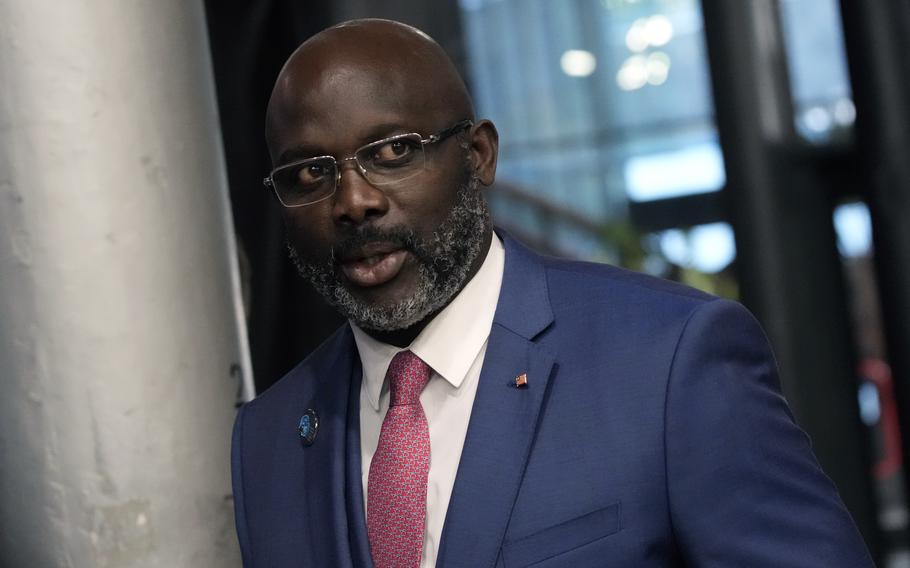
Liberia President George Weah arrives to attend the Paris Peace Forum, in Paris, France, Nov. 11, 2021. (Christophe Ena/AP)
The African continent seems not to be enjoying the best of times when it comes to democracy.
The mostly free and fair elections recently held in Kenya and Zambia notwithstanding, there have been no fewer than 10 attempted coups on the continent since 2020 — the latest resulting in the overthrow of leaders in Gabon and Niger.
The collective response in Washington, as with other Western capitals, seems to be a forlorn shrug.
Consumed with a war in Europe (Ukraine), intense rivalry in Asia (China), a thirst for populism in Latin America (Argentina), and faced with the specter of a fundamentalist nuclear threat in the heart of the Middle East (Iran), American officials could easily be seduced into thinking that Africa does not matter.
Nothing could be farther from the truth.
Naunihal Singh, a political scientist at the U.S. Naval War College, recently noted in an interview that African coups are increasing because of “a more permissive environment.” Would-be authoritarians on the continent appear to be less concerned than ever with the consequences resulting from illegitimate power grabs. The United States may be partly to blame. Indeed, U.S. authorities have created power vacuums by abandoning the influence they should be leveraging to benefit Africans.
But ignoring Africa is not simply dishonorable, it is a geostrategic mistake — and it is not just coups that require attention, but also elections.
One upcoming election American officials should be paying attention to will be held in the Republic of Liberia on Oct. 10, where a rerun of the 2017 contest between incumbent President George Weah and his two prior challengers — former Vice President Joseph Boakai and business leader Alexander Cummings — is scheduled to take place.
That this will be the first election primarily organized by the Liberian government since the drawdown of the U.N. mission in 2018 has led many observers to voice concerns. A joint statement issued on Aug. 31 by the United Nations and the Economic Community of West African States (ECOWAS) expressed grave concern about reports of election violence and “inflammatory rhetoric which has the potential to instigate violence.”
These warnings must be heeded carefully as Liberia remains on a tenuous path of recovery since suffering disastrous civil wars between 1989-1997 and 1999-2003. Some of the same warlords who participated in these atrocities remain active, desperately looking for any chance to return to power.
The U.S. Embassy in Monrovia has let it be known that some individuals will not be welcomed as partners. Over the past three years, five Liberians have been designated for sanctioning by the Treasury Department under the Global Magnitsky Act, representing an unprecedented intervention during peacetime. Three of those individuals who were serving in Weah’s administration were pressured to resign — a move welcomed by Washington.
Nevertheless, the most notorious name on the sanctions list, Senator Prince Yormie Johnson, appears to have a senior proxy at the Executive Mansion.
Earlier this year, Boakai surprised his supporters by selecting Jeremiah Koung to be his nominee for vice president. A steward of the Movement for Democracy and Reconstruction party, a group founded and controlled by Johnson, Koung’s selection led to a party realignment that could position a sanctioned warlord a heartbeat from the presidency.
Many Liberians recall with horror the 14 minutes of video footage featuring Johnson personally directing the torture and assassination of President Samuel Doe in 1990, infamously enjoying a beer while Doe’s ear was cut off. The report by Liberia’s Truth and Reconciliation Commission identifies a long list of other victims who were allegedly killed by Johnson and/or his forces.
In the years since the war, Johnson says he has “found God,” and renounced his violent past. But there remain ongoing concerns of corrupt practices cited by the Treasury Department that motivated his designation. The Treasury news release pointed to Johnson’s alleged record of “pay-for-play funding with government ministries and organizations for personal enrichment,” as well as the sale of votes in multiple Liberian elections.
The third-party candidacy of Alexander Cummings and his Alternative National Congress party have gained appeal among educated entrepreneurs and diaspora groups. His candidacy hinges on an ambitious reform platform with his technocratic competence illustrated by a long and successful corporate career with The Coca-Cola Co. But his campaign has encountered challenges when it comes to expanding support in more rural areas.
That leaves the incumbent Weah, the former international soccer star with celebrity status among much of the country’s indigenous youth. Weah’s administration has been heavily criticized over management of the economy; his choice of running mate, Jewel Howard Taylor, the estranged former wife of Charles Taylor, has presented its own challenges. But up against the 78-year-old Joe Boakai, with Prince Johnson seemingly waiting in the wings, Weah and the CDC appear to be the most predictable and safe outcome.
Recent coups and instability across the region, coupled with the rising influence of Russia and other actors hostile to the United States, demonstrates that the U.S. and the wider international community must support its democratic partners and condemn those seeking to promote instability, leverage endemic corruption, and tear down democratic institutions and norms to consolidate their own influence.
Liberia is a long-standing ally and partner of the United States in a turbulent region. American officials, and the broader international community, should pay close attention to an election that runs the risk of ushering a U.S.-sanctioned ex-warlord into power in West Africa.
It is up to the people of Liberia to freely choose their next president. But they should do so with a full awareness of the risk that choice brings in terms of relations with the country’s key international partners.
Ivan Sascha Sheehan is the associate dean of the College of Public Affairs and past executive director of the School of Public and International Affairs at the University of Baltimore. Opinions expressed are his own.